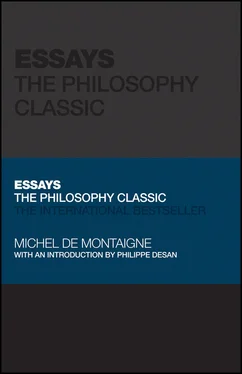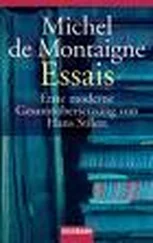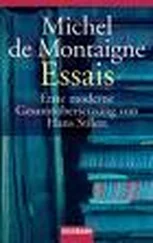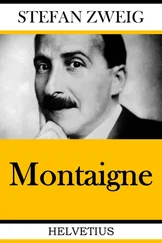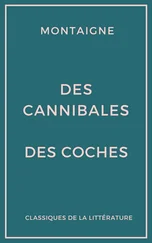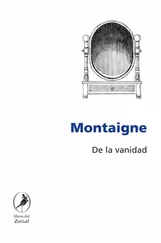Michel de Montaigne - Essays
Здесь есть возможность читать онлайн «Michel de Montaigne - Essays» — ознакомительный отрывок электронной книги совершенно бесплатно, а после прочтения отрывка купить полную версию. В некоторых случаях можно слушать аудио, скачать через торрент в формате fb2 и присутствует краткое содержание. Жанр: unrecognised, на английском языке. Описание произведения, (предисловие) а так же отзывы посетителей доступны на портале библиотеки ЛибКат.
- Название:Essays
- Автор:
- Жанр:
- Год:неизвестен
- ISBN:нет данных
- Рейтинг книги:3 / 5. Голосов: 1
-
Избранное:Добавить в избранное
- Отзывы:
-
Ваша оценка:
- 60
- 1
- 2
- 3
- 4
- 5
Essays: краткое содержание, описание и аннотация
Предлагаем к чтению аннотацию, описание, краткое содержание или предисловие (зависит от того, что написал сам автор книги «Essays»). Если вы не нашли необходимую информацию о книге — напишите в комментариях, мы постараемся отыскать её.
Essays: The Philosophy Classic
Essays: The Philosophy Classic
Essays — читать онлайн ознакомительный отрывок
Ниже представлен текст книги, разбитый по страницам. Система сохранения места последней прочитанной страницы, позволяет с удобством читать онлайн бесплатно книгу «Essays», без необходимости каждый раз заново искать на чём Вы остановились. Поставьте закладку, и сможете в любой момент перейти на страницу, на которой закончили чтение.
Интервал:
Закладка:
Omnes eodem cogimur; omnium
Versatur urna serius ocius
Sors exitura, et nos in aeternum
Exilium impositura cymbae.
[We are all bound one voyage; the lot of all, sooner or later, is to come out of the urn. All must to eternal exile sail away.
—Horace, Odes , ii. 3, 25.]
and, consequently, if it frights us, it is a perpetual torment, for which there is no sort of consolation. There is no way by which it may not reach us. We may continually turn our heads this way and that, as in a suspected country:
Quae, quasi saxum Tantalo, semper impendet.
[Ever, like Tantalus stone, hangs over us.
—Cicero, De Finibus , i. 18.]
Our courts of justice often send back condemned criminals to be executed upon the place where the crime was committed; but, carry them to fine houses by the way, prepare for them the best entertainment you can—
Non Siculae dapes
Dulce melaborabunt saporem:
Non avium cyatheaceae cantus
Somnum reducent.
[Sicilian dainties will not tickle their palates, nor the melody of birds and harps bring back sleep.
—Horace, Odes , iii. 1, 18.]
Do you think they can relish it? and that the fatal end of their journey being continually before their eyes, would not alter and deprave their palate from tasting these regalios?
Audit iter, numeratque dies, spatioque viarum
Metitur vitam; torquetur peste futura.
[He considers the route, computes the time of travelling, measuring his life by the length of the journey; and torments himself by thinking of the blow to come.
—Claudianus, In Rufinum , ii. 137.]
The end of our race is death; it is the necessary object of our aim, which, if it fright us, how is it possible to advance a step without a fit of ague? The remedy the vulgar use is not to think on it; but from what brutish stupidity can they derive so gross a blindness? They must bridle the ass by the tail:
Qui capite ipse suo instituit vestigia retro
[Who in his folly seeks to advance backwards
—Lucretius, iv. 474.]
It is no wonder if he be often trapped in the pitfall. They affright people with the very mention of death, and many cross themselves, as it were the name of the devil. And because the making a man's will is in reference to dying, not a man will be persuaded to take a pen in hand to that purpose, till the physician has passed sentence upon and totally given him over, and then between and terror, God knows in how fit a condition of understanding he is to do it.
The Romans, by reason that this poor syllable death sounded so harshly to their ears and seemed so ominous, found out a way to soften and spin it out by a periphrasis, and instead of pronouncing such a one is dead, said, “Such a one has lived,” or “Such a one has ceased to live” [Plutarch, Life of Cicero , c. 22] for, provided there was any mention of life in the case, though past, it carried yet some sound of consolation. And from them it is that we have borrowed our expression, “The late Monsieur such and such a one.” [“feu Monsieur un tel.”] Peradventure, as the saying is, the term we have lived is worth our money. I was born between eleven and twelve o'clock in the forenoon the last day of February 1533, according to our computation, beginning the year the 1st of January [This was in virtue of an ordinance of Charles IX in 1563. Previously the year commenced at Easter, so that the 1st January 1563 became the first day of the year 1563.] and it is now but just fifteen days since I was complete nine-and-thirty years old; I make account to live, at least, as many more. In the meantime, to trouble a man's self with the thought of a thing so far off were folly. But what? Young and old die upon the same terms; no one departs out of life otherwise than if he had but just before entered into it; neither is any man so old and decrepit, who, having heard of Methuselah, does not think he has yet twenty good years to come. Fool that you are! who has assured unto you the term of life? Thou dependest upon physicians’ tales: rather consult effects and experience. According to the common course of things, it is long since that thou hast lived by extraordinary favour; thou hast already outlived the ordinary term of life. And that it is so, reckon up thy acquaintance, how many more have died before they arrived at thy age than have attained unto it; and of those who have ennobled their lives by their renown, take but an account, and I dare lay a wager thou wilt find more who have died before than after five-and-thirty years of age. It is full both of reason and piety, too, to take example by the humanity of Jesus Christ Himself; now, He ended His life at three-and-thirty years. The greatest man, that was no more than a man, Alexander, died also at the same age. How many several ways has death to surprise us?
Quid quisque, vitet, nunquam homini satis
Cautum est in horas.
[Be as cautious as he may, man can never foresee the danger that may at any hour befall him.
—Horace, Odes , ii. 13, 13.]
To omit fevers and pleurisies, who would ever have imagined that a duke of Brittany [Jean II, died 1305] should be pressed to death in a crowd as that duke was at the entry of Pope Clement, my neighbour, into Lyons? [Montaigne speaks of him as if he had been a contemporary neighbour, perhaps because he was the Archbishop of Bordeaux. Bertrand le Got was Pope under the title of Clement V, 1305-14.] Hast thou not seen one of our kings [Henry II, killed in a tournament, July 10, 1559] killed at a tilting, and did not one of his ancestors die by jostle of a hog? [Philip, eldest son of Louis le Gros] Aeschylus, threatened with the fall of a house, was to much purpose circumspect to avoid that danger, seeing that he was knocked on the head by a tortoise falling out of an eagle's talons in the air. Another was choked with a grape-stone; [Val. Max., ix. 12, ext. 2.] an emperor killed with the scratch of a comb in combing his head. Aemilius Lepidus with a stumble at his own threshold, [Pliny, Natural History , vii. 33] and Aufidius with a jostle against the door as he entered the council-chamber. And between the very thighs of women, Cornelius Gallus the proctor; Tigillinus, captain of the watch at Rome; Ludovico, son of Guido di Gonzaga, Marquis of Mantua; and (of worse example) Speusippus, a Platonic philosopher, and one of our Popes. The poor judge Bebius gave adjournment in a case for eight days; but he himself, meanwhile, was condemned by death, and his own stay of life expired. Whilst Caius Julius, the physician, was anointing the eyes of a patient, death closed his own; and, if I may bring in an example of my own blood, a brother of mine, Captain St. Martin, a young man, three-and-twenty years old, who had already given sufficient testimony of his valour, playing a match at tennis, received a blow of a ball a little above his right ear, which, as it gave no manner of sign of wound or contusion, he took no notice of it, nor so much as sat down to repose himself, but, nevertheless, died within five or six hours after of an apoplexy occasioned by that blow.
These so frequent and common examples passing every day before our eyes, how is it possible a man should disengage himself from the thought of death, or avoid fancying that it has us every moment by the throat? What matter is it, you will say, which way it comes to pass, provided a man does not terrify himself with the expectation? For my part, I am of this mind, and if a man could by any means avoid it, though by creeping under a calf's skin, I am one that should not be ashamed of the shift; all I aim at is, to pass my time at my ease, and the recreations that will most contribute to it, I take hold of, as little glorious and exemplary as you will:
Читать дальшеИнтервал:
Закладка:
Похожие книги на «Essays»
Представляем Вашему вниманию похожие книги на «Essays» списком для выбора. Мы отобрали схожую по названию и смыслу литературу в надежде предоставить читателям больше вариантов отыскать новые, интересные, ещё непрочитанные произведения.
Обсуждение, отзывы о книге «Essays» и просто собственные мнения читателей. Оставьте ваши комментарии, напишите, что Вы думаете о произведении, его смысле или главных героях. Укажите что конкретно понравилось, а что нет, и почему Вы так считаете.
